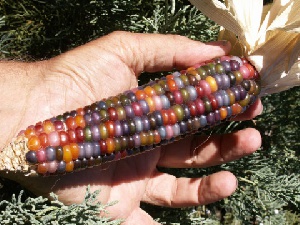Health News of Tuesday, 8 April 2014
Source: GNA
Genetically modified foods pose no risk
Dr. Margaret Ottah Atikpo, Deputy Director of Council for Scientific and Industrial Research (CSRI) - Food Research Institute (FRI), on Friday, reiterated that Genetically Modified (GM) foods posed no risk to lives.
She said GM foods were not harmful to human and animals as claimed by some anti-GM activists and, therefore, called on farmers and the general public to disabuse their minds on such campaigns.
Dr. Atikpo made the claim in a presentation on a topic “Modern Agricultural Biotechnology – a Tool towards Food Security in Ghana” at a day’s regional workshop jointly organised by the Open Forum on Agricultural Biotechnology in Africa (OFAB) and CSIR at Abesim near Sunyani.
The workshop, aimed at establishing and managing a range of platforms to enhance understanding of biotechnology in agriculture for productivity was attended by 60 participants, including traditional rulers, the media, farmers, Municipal and District Chiefs Executives (M/DCEs) and the general public from Brong-Ahafo.
She said biotechnology foods had been in the system for years, but there had not been any report from any health institution indicating that a patient had died as a result of consuming GM foods.
Dr. Atikpo stated that, in health, biotechnology was applied in drug production such as insulin injection for diabetic patients, and added that people were not complaining about the use of that and other drugs because they feared to die.
She said modern biotechnology foods like cornflakes, yoghurt and cheese had been consumed for a very long time, but has not endangered any individual’s life.
Dr. Atikpo, therefore, debunked the notion by a section of the public that organism (bacteria, viruses) or fluids from spiders, lizards and frogs were injected into food crops like tomatoes or cassava, but rather only the genes that are modified or transferred into genomes.
She observed that modern biotechnology had come to address many challenges of farmers including pests, weeds and diseases spoilage due to over-ripening, poor quality soil, inadequate irrigation and absence of appropriate technology.
Dr. Atikpo stated the need for modern biotechnology since weeds competed with crops for water, nutrients, sunlight, space and also harboured insects, pest and diseases and also contaminated harvest.
She said modern biotechnology was a vital tool for not only fighting weeds to improve yields, but reducing the rate of spraying to decrease carbon emissions as its environmentally friendly method.
Dr. Atikpo expressed the hope that GM technology would solve the problem of nutritional deficiency in children with the introduction of the Golden rice which contained vitamin A and iron.
She stated that Vitamin A deficiency in about 124 million children worldwide had led to either their blindness or death.
Dr. Atikpo added that GM technology could address Cassava Brown Streak Virus (CBSV) disease spreading from East Africa, Cape St. Paul’s Wilt Disease of coconut in Ghana and Groundnut Rosette Disease in Northern Ghana.
She said information about GM biotechnology were available on Cassette Discs (CDs) and many websites and, therefore, directed farmers and the general public to read about the issue for deeper understanding to be able to challenge anti-GM activists who were trying to discourage the application of the concept or use of GM foods and seeds.
Participants later in a forum expressed satisfaction for the education and clarifications they had been given about some misconceptions of the technology in the country.
Entertainment










